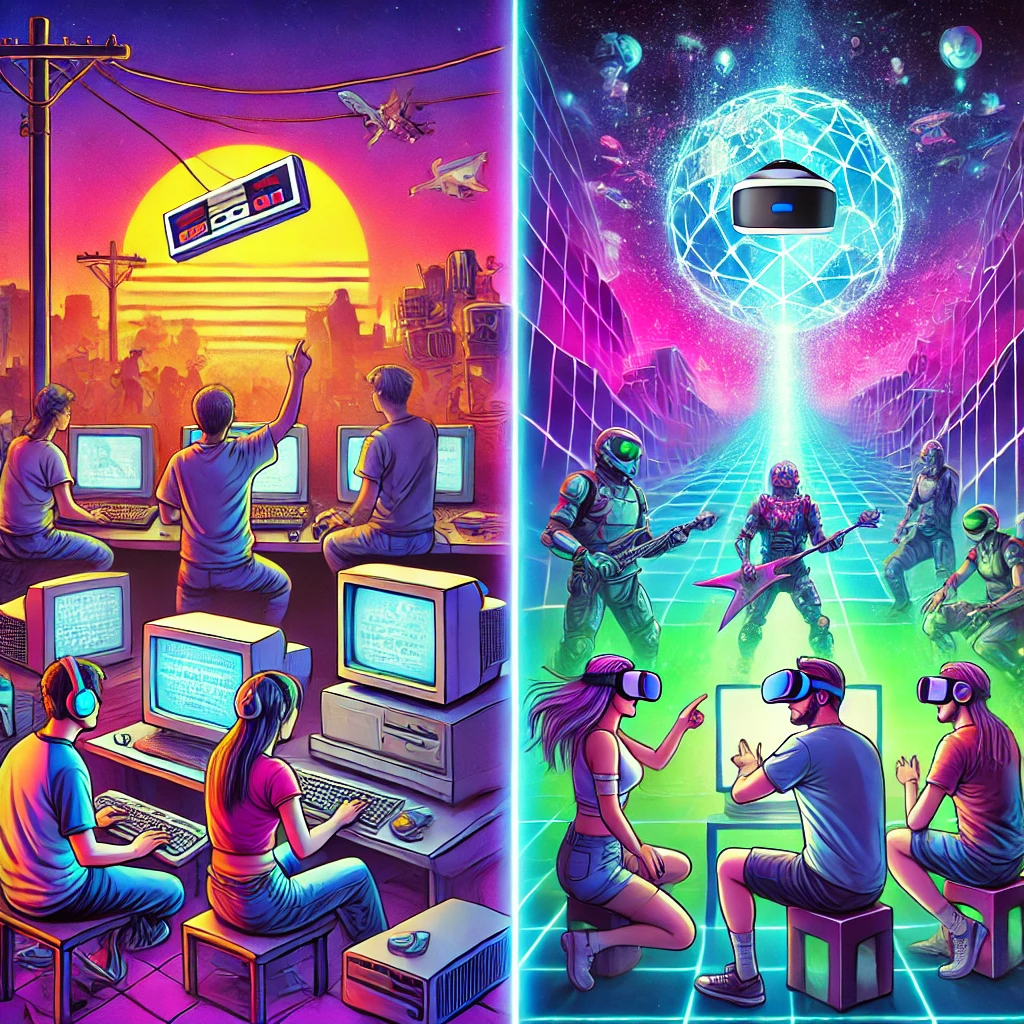Online gaming has seen significant changes over the years. It started as small groups of fans connecting through Local Area Networks (LAN) and has now become large virtual worlds powered by advanced technology, attracting millions of players globally. The idea of the metaverse—a shared, immersive virtual space—is now the future of online gaming, merging the digital and physical worlds.
This article explores the key milestones in the evolution of online gaming, from its early days to its current state as a global phenomenon, and looks at what the future may bring.
1. The Early Days: The Rise of LAN Gaming
The early days of online gaming date back to LAN parties in the 1990s, where players connected their computers to a local network for multiplayer experiences.
- Popular Titles: Early games like DOOM and Quake were essential in creating competitive gaming scenes. These games allowed players to compete against each other in the same room, promoting camaraderie and competition.
- Challenges: Setting up a LAN network required technical knowledge, and the experience was limited to those physically present.
- Significance: LAN gaming laid the foundation for multiplayer gaming by emphasizing teamwork and real-time interaction.
While basic by today’s standards, LAN parties were a cultural phenomenon that highlighted the potential of multiplayer gaming.
2. The Internet Revolution: Online Multiplayer Takes Off
The introduction of the internet in the late 1990s and early 2000s brought a massive shift in gaming.
- MMORPGs: Games like Ultima Online and EverQuest allowed players to connect globally, creating persistent virtual worlds where characters and economies evolved over time.
- First-Person Shooters: Games like Counter-Strike introduced competitive online play, leading to the rise of esports.
- Accessibility: Broadband internet made it easier for players to connect, reducing lag and enhancing the gaming experience.
This era marked the beginning of online gaming as we know it today, with players no longer restricted by geographic boundaries.
3. The Rise of Consoles and Cross-Platform Gaming
The mid-2000s saw consoles integrating online capabilities, bringing multiplayer gaming to living rooms worldwide.
- Xbox Live and PlayStation Network: These services revolutionized console gaming, allowing players to compete and cooperate online seamlessly.
- Iconic Games: Titles like Halo 2, Call of Duty: Modern Warfare, and Gears of War popularized online gaming on consoles.
- Cross-Platform Play: The gradual introduction of cross-platform gaming allowed players on different devices to compete together, fostering inclusivity.
Console gaming’s adoption of online functionality significantly expanded the reach of multiplayer gaming.
4. The Social Gaming Boom
The 2010s saw the rise of social gaming, where games became platforms for connection and creativity.
- Mobile Games: Titles like Clash of Clans and Candy Crush Saga brought multiplayer gaming to mobile devices, reaching casual gamers.
- Battle Royale Games: Games like Fortnite and PUBG created massive online arenas, where players competed in fast-paced survival matches.
- Streaming and Content Creation: Platforms like Twitch and YouTube Gaming turned gamers into celebrities, reshaping the culture around gaming.
Social gaming showed that online games could be more than competitive—they could be cooperative, creative, and social experiences.
5. Virtual Reality and the Metaverse: The Future of Online Gaming
Today, the concept of the metaverse is redefining what online gaming can be.
- What is the Metaverse? The metaverse is a shared virtual space where users can interact with each other and digital environments in real-time, often using VR or AR technology.
The journey of online gaming from LAN parties to the metaverse shows a remarkable evolution, promising even more exciting developments in the future. Games Leading the Innovation
Titles like Roblox and Minecraft provide platforms for players to build, explore, and interact within virtual worlds, setting the stage for metaverse experiences.
VR Developments
Devices such as the Oculus Quest and PlayStation VR are making immersive gaming more accessible to a broader audience.
Blockchain Integration
Blockchain technology allows for the ownership of digital assets like skins and NFTs, adding new layers to virtual economies.
The metaverse is set to transform gaming into a deeply immersive experience, blending entertainment, commerce, and social interaction.
The Impact of Online Gaming Evolution
The evolution of online gaming has had significant effects on culture, technology, and society:
Cultural Influence
Gaming has become a mainstream form of entertainment, shaping movies, music, and fashion.
Economic Growth
The gaming industry generates billions in revenue through microtransactions, subscriptions, and esports.
Social Connectivity
Online gaming unites people, fostering friendships and communities worldwide.
Gaming has evolved from a niche hobby to a global cultural phenomenon, influencing various aspects of modern life.
Challenges and Opportunities
As online gaming continues to evolve, it faces several challenges:
Accessibility
Making new technologies like VR affordable and inclusive for all players.
Security Concerns
Protecting players’ data and preventing cheating are ongoing priorities.
Ethical Considerations
Addressing issues like addiction, toxicity, and the impact of virtual economies on real-world finances.
These challenges also provide opportunities for innovation and growth within the industry.
Conclusion
The evolution of online gaming, from LAN parties to the metaverse, reflects humanity’s desire to connect, compete, and create. What started as small-scale multiplayer experiences has grown into a global phenomenon, with virtual worlds that blur the line between reality and imagination.
As technology continues to advance, online gaming will undoubtedly reach new heights, transforming how we play and interact with both digital and physical worlds. The journey is ongoing, and the possibilities are as limitless as the virtual environments we now inhabit.
